T lymphocytes’ distinct properties form the foundation of adoptive T cell therapies and play a central role in the human immune system. These innovative therapeutic approaches leverage specific T cells’ inherent functions to fight a range of diseases.
Chimeric Antigen Receptor T cell (CAR-T) therapy and Tumor-Infiltrating Lymphocyte (TIL) therapy are among the most promising T cell-based therapies. These ground-breaking new techniques offer a promising future in the treatment of previously intractable conditions, having already demonstrated the capacity to produce effective and persistent clinical responses in patients.
Despite their extensive potential, major challenges exist in terms of the widespread implementation of T cell therapies, most notably the scaling up of the Chemistry, Manufacturing, and Controls (CMC) process for engineering T cells.
This intricate and demanding process involves multiple steps, including the ex vivo activation, expansion, and genetic modification of T cells.
Optimizing and standardizing these processes remains key to producing consistent, high-quality, therapeutically effective T cells. As the field advances, these challenges must be addressed to fully realize the potential of T cell-based therapies while making them accessible to a much wider patient population.
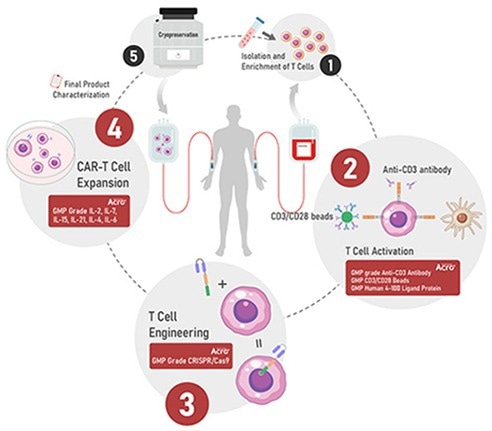
Figure 1. Manufacturing process of CAR-T Cell therapy workflow. Image Credit: ACROBiosystems
ACROBiosystems is committed to supporting immune cell therapy research. The company continues to leverage its robust platforms to develop a series of materials and services suitable for the CMC production process of T cells. These include the company’s:
- Cell culture platform
- Antibody development platform
- Flow cytometry validation platform
- GMP quality management system
ACROBiosystems’ comprehensive product portfolio includes solutions for:
- T cell activation
- T cell culture
- T cell engineering
- CMC process purification
These solutions have been designed to support scientists and pharmaceutical companies worldwide in their efforts to further develop adoptive T cell therapies.
CMC production process for adoptive T cell therapies
T cell activation
T cell activation is an essential step in adoptive T cell therapies. This process generally uses anti-CD3 and anti-CD28 antibodies or CD3/CD28 antibody-conjugated magnetic beads, which activate T cells by mimicking signaling processes in vivo.
Certain growth factors and cytokines are also introduced into the culture medium because they are key to stimulating T cell proliferation and differentiation in vitro.
High-quality, GMP-grade ancillary reagents must be employed throughout this process. For example, commercially available anti-CD3 (OKT3) antibodies and CD3/CD28 antibody-conjugated magnetic beads can meet the stringent quality standards required.
These products undergo demanding virus removal steps and testing before use. They are also free from animal-derived components, offering enhanced safety profiles, high stability, and batch-to-batch consistency.
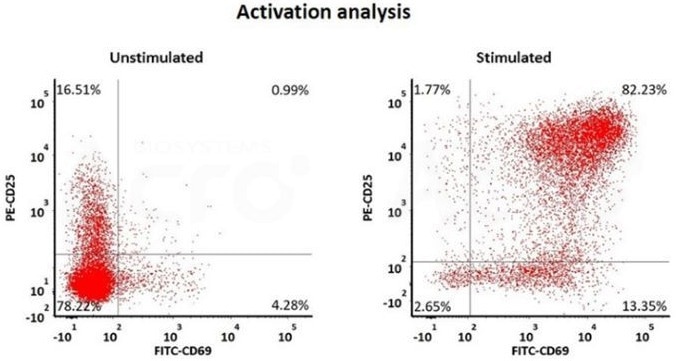
The human T cells were effectively stimulated with GMP ActiveMax® Human T cell Activation/Expansion CD3/CD28 Beads (Cat. No. GMP-MBS001). Image Credit: ACROBiosystems
T cell culture
Once initial activation through signal stimulation has taken place, T cell proliferation and additional activation are dependent on a cocktail of cytokines. A range of high-quality GMP-grade cytokines, including IL-2, IL-7, IL-15, IL-21, and TNF-α, have been developed specifically for T cell culture applications.
These cytokines are created according to rigorous quality management systems and subjected to GMP-grade release testing, which confirms their appropriateness for advanced cell therapy applications.
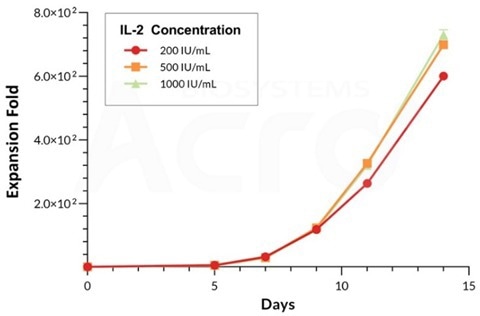
Cell viability curve of PBMCs cultured with IL-2. Increasing concentrations of GMP IL-2 (Cat. No. GMP-L02H14) were added as a growth factor supplement to PBMCs, which showed consistent and high cell viability up to Day 14. Image Credit: ACROBiosystems
T cell engineering
The introduction of CRISPR/Cas gene-editing technology in allogeneic CAR-T therapy has become recognized as a powerful tool in mitigating the risks of graft-versus-host disease (GvHD) and allogeneic rejection.
GENPower™ NLS-Cas9 Nuclease and other GMP-grade gene-editing tools have been specifically engineered to exhibit high bioactivity and TCR knockout efficiency, characteristics that have been robustly validated via in vitro and in vivo studies.
These tools offer ultra-low endotoxin levels, a characteristic that makes them ideally suited to streamlining and accelerating T cell engineering processes.
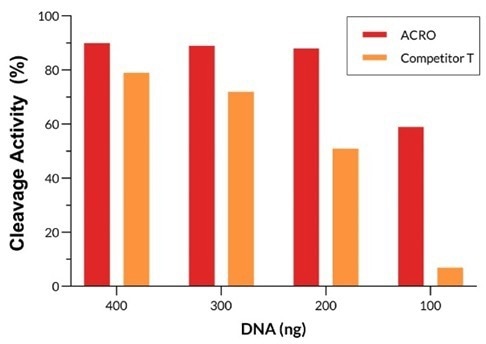
Different amounts of Cas9 were incubated with the same amount of excess gRNA and plasmid for 60 minutes at 37 °C. When using 400-200 ng ACRO Cas9, the cutting efficiency is greater than 90 %. In comparison, when using a 200 ng Competitor T, the cutting efficiency is only about 50 %. Image Credit: ACROBiosystems

The gRNA and plasmid cutting efficiency and the TCR knockout efficiency with GMP GENPower™ NLS-Cas9 Nuclease (Cat. No. GMP-CA9S18). Image Credit: ACROBiosystems
Process purification
The production of lentiviral packaging plasmids is another essential step in CAR-T cell preparation, but this process can lead to nucleic acid residues that pose risks of infection or tumorigenicity ricks. Bioproduct safety regulation requires that this challenge be appropriately addressed.
GMP-grade universal nucleases have been developed by leveraging advanced enzyme modification technology platforms, AI simulation, and high-throughput screening.
These nucleases are available in conventional (GMP-NUES19) and salt-active (GMP-NUES13) versions and have been optimized to efficiently remove nucleic acid contamination in biopharmaceutical processes.
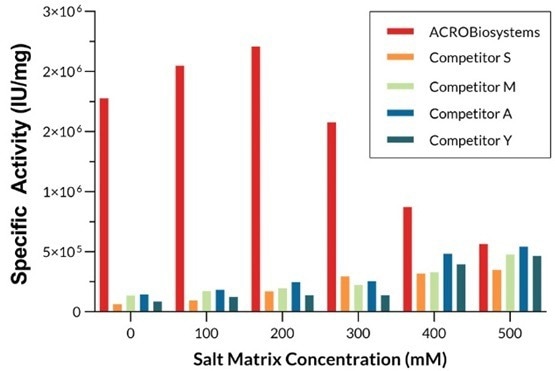
GMP Salt Active GENIUS™ Nuclease (Cat. No. GMP-NUES13) can maintain high enzyme activity under 0-500 mM NaCl conditions; The enzyme activity of GMP-NUES13 under 0-500 mM conditions is significantly better than that of competitors. Image Credit: ACROBiosystems
Acknowledgments
Produced from materials originally authored by ACROBiosystems.
About ACROBiosystems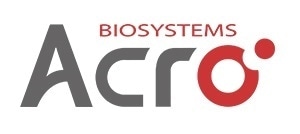
ACROBiosystems is a cornerstone enterprise of the pharmaceutical and biotechnology industries. Their mission is to help overcome challenges with innovative tools and solutions from discovery to the clinic. They supply life science tools designed to be used in discovery research and scalable to the clinical phase and beyond. By consistently adapting to new regulatory challenges and guidelines, ACROBiosystems delivers solutions, whether it comes through recombinant proteins, antibodies, assay kits, GMP-grade reagents, or custom services. ACROBiosystems empower scientists and engineers dedicated towards innovation to simplify and accelerate the development of new, better, and more affordable medicine.
Sponsored Content Policy: News-Medical.net publishes articles and related content that may be derived from sources where we have existing commercial relationships, provided such content adds value to the core editorial ethos of News-Medical.Net which is to educate and inform site visitors interested in medical research, science, medical devices and treatments.